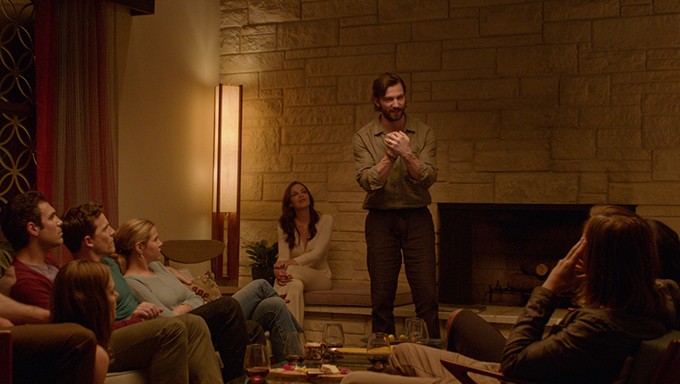Karyn Kusama wrote and directed her first feature film, “Girlfight,” in 1999. The film won the Director’s Prize and shared the Grand Jury Prize at the 2000 Sundance Film Festival. It went on to win the Grand Prize at the Deauville Film Festival, the Prix de la Jeunesse at the Cannes Film Festival and the IFP’s Gotham Award for Best Feature.
In 2004, Kusama directed the science-fiction love story “Aeon Flux” for Paramount Pictures. The film starred Charlize Theron, Marton Csokas and Frances McDormand, and was released in theaters in 2005. Her third feature was the comedy-horror film “Jennifer’s Body,” written by Diablo Cody. The film starred Amanda Seyfried, Megan Fox and Adam Brody, and was released by Twentieth Century Fox in 2009. (Press materials)
“The Invitation” will premiere at the 2015 BFI London Film Festival on October 9.
W&H: Please give us your description of the film playing.
KK: “The Invitation” is a meditation on grief and loss carried within a suspense drama. At its core, it’s about a dinner party gone horribly wrong and about the consequences of denying our pain.
W&H: What drew you to this story?
KK: This movie made me think about the paranoid thrillers of the ’70s that I love, movies that leave the viewer with more questions than answers. I was interested in the discomfort and dread I felt when I first read [Phil Hay and Matt Manfredi’s] script — those feelings put me in touch with the discomfort and dread I sometimes unwittingly carry around in my daily life. The story is an exploration of those tendrils of emotion and an example of our worst fears blowing up into a nightmare, which felt very cinematic to me.
W&H: What was the biggest challenge in making the film?
KK: The containment of the story combined with the large number of actors navigating their way through the scenes made shooting more difficult than one would initially imagine it might be. On the page it reads like an “easy indie,” when in fact it’s deceptively challenging to film so many points of view and have to stage all the actors in a limited space.
W&H: What do you want people to think about when they are leaving the theater?
KK: I want people to leave the theater wrestling with the idea that our pain — physical, emotional and spiritual pain — is more than just a condition that needs to be silenced, numbed or “fixed.” Pain in all its forms is also a message, a kind of distress signal to our hearts and minds. There are times when it’s really important to tune into that message and just listen to it. When we don’t listen, our understanding of the world gets more and more distorted, and we become capable of doing things we very often regret. This movie takes that idea to an uncomfortable extreme.
W&H: What advice do you have for other female directors?
KK: It’s the same advice I offer to male directors: We have to accept that making movies is a never-ending process of occasional progress, frequent setbacks and unexpected curveballs being thrown our way. Navigating that process requires stamina, curiosity, openness and creative fire. It is absolutely essential that the process alone be fulfilling enough, because in the end that’s what you’ll spend most of your time doing — being in the process, and not always landing on the desired results. There’s no glory in climbing a mountain if all you want to do is to get to the top. It’s experiencing the climb itself — in all its moments of revelation, heartbreak and fatigue — that has to be the goal.
W&H: How did you get your film funded?
KK: I am honored and lucky to be one of the first films funded by Gamechanger Films, a consortium of investors who finance movies directed by women. Once we secured that money, it was easier to complete the rest of the financing with another new financing outfit called LegeArtis. Overall, getting this movie made took tenacity, patience and some even-keeled optimism.
W&H: Name your favorite woman-directed film and why.
KK: That’s a tough question because there ARE TOO MANY! So in the spirit of mixing things up — I’ll offer five of my favorites:
1) Chantal Akerman’s “Jeanne Dielman, 23 Quai du Commerce, 1080 Bruxelles.” If I had to choose just one film, this would have to be it. Akerman directed this 200-minute domestic epic at the tender age of 25 years old, and without a doubt, it is one of the slyest, most radical, sophisticated and vividly realized works of cinema ever made. To all directors, male and female: to watch this masterpiece of a film is to be humbled by the genius of its maker. All hail Chantal!
2) Martha Coolidge’s “Valley Girl.” it’s the movie that made me feel, at 14, that I could do this, too. I still have to watch it once a year. Its compassion and humor still speak to me. And I can quote every line of it back to the TV.
3) Claire Denis’s “Beau Travail” is one of Denis’s greatest achievements. One of the most mysterious and beautiful endings in movies.
4) Jane Campion’s “An Angel at My Table” is another film that made me want to make movies. Uncompromising, observant, personal filmmaking.
5) Kathryn Bigelow’s “Point Break.” What can I say that hasn’t already been said? Pure action-pop perfection.







